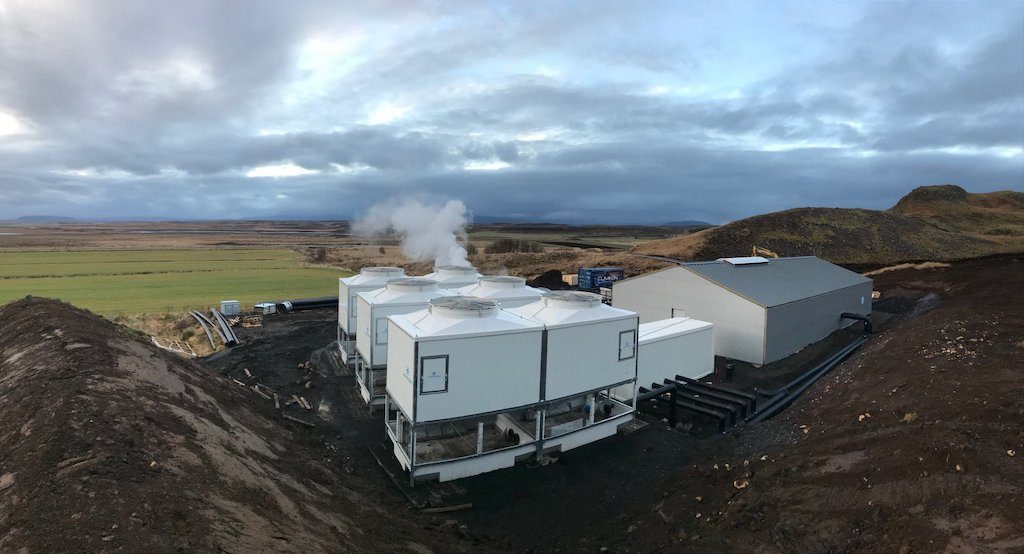Climeon positive on geothermal business despite challenges in 2019

Despite challenges and delays on its key markets in Iceland and Japan, Climeon has made breakthroughs in its geothermal business and increased overall sales in 2019.
In its report to the market on the year-end results for 2019, Swedish heatpower supplier Climeon provides details on achievements and challenges faced in the past year.
“The fourth quarter 2019 was eventful and Climeon passed several important milestones. We won our first order for power plants based on reciprocating engines, so-called gensets, an area with large potential for us. Now that solar and wind power are expanding quickly, many countries use power plants based on large combustion engines to balance the power grid (for example when there is no wind, or at night). These power plants work as a sustainable baseload power in countries where geothermal heat power or hydro power can’t be used but they still want to move away from dirty power sources such as coal. Climeon’s modules recover the waste heat from the power plants which increases their efficiency and reduces CO2. Besides environmental benefits this also creates significant cost benefits for the power plant operators.
In December 2019, we announced a new partnership with the New Zealandic company Geo40, which opens up the opportunity to approach a new part of the geothermal market. More than half of the world’s geothermal power plants have waste heat in Climeon’s temperature range that is currently not being used for electricity production. Silica in the brine creates scaling in the wells and piping, which limits the amount of heat that can be recovered and utilized. With Geo40’s technology for silica and mineral extraction the geothermal wastewater, the brine, can be used for power production. For us, this collaboration means we can approach the large power plants with a new, attractive offer which solves existing problems with scaling and at the same time increases output. Just as in other geographic markets, we aim to launch a first pilot project to prove ourselves in this area, then we can scale up the segment.
Another important milestone during the quarter was that our customer Virgin Voyages approved us in Sea Trials. The lead times for shipbuilding are long. Our first order from Fincantieri and Virgin Voyages came as early as 2016, the first delivery from us was completed in December 2017 and only now is the first vessel, Scarlet Lady, ready for commercial operation. We have worked incredibly hard for several years to meet the tough demands of Fincantieri Virgin Voyages and Lloyd’s Register. Therefore, it feels very satisfying that the first ship, with six Climeon modules installed on board, is now test run and ready. At the same time, installation is on-going onboard Virgin Voyages next two ships, as well as onboard Maersk’s ship.
Looking at the full year 2019, net sales grew significantly. This is the result of the organizational and strategic changes we have made within the sales organization. During the fourth quarter we delivered additional modules for the upcoming projects in Iceland and Japan, as well as the two steam turbines that will be tested by Viking Line. In total, net sales for 2019 amounted to SEK 117 million, a significant increase compared with the previous year. Despite delays on several fronts in 2019, we see that we are moving forward with continued growth and increased deliveries, although the delays are expected to burden us somewhat financially and operationally. It is now clear that the large roll-out of the Icelandic order will take longer than previously estimated, but we continue to believe in the Icelandic market and the need for a distributed baseload power. Both in Iceland and in Japan, our teams are working hard together with our customers to bring up a total of four power plants in the first half of 2020. Step by step, we continue to work towards our vision of delivering fossil-free heat power and becoming the world’s number one climate solver.”
Commenting on details related to its geothermal business, the company reports that “although the Japanese government has made policy changes to support installations below 10 MW, the permitting processes still take several months. Many landowners in rural Japan have struggled to find a commercial use for their land as the spa business has been in decline for several years. The interest in leasing their land out for small scale geothermal power development has therefore increased. For example, the Japanese Government stated that they will try to further decrease the current barriers for investments in geothermal energy.”
In Iceland, with opposition to larger scale power development the overall reception to small-scale development like the one offered by Climeon is positive, while low electricity prices make it challenging for small operators like Climeon’s Icelandic partner Varmaorka.
Geothermal remains the largest market for Climeon with 94% of the company’s product backlog being represented by geothermal units.
Actual Year-End 2019 Report (pdf)
Source: Company release